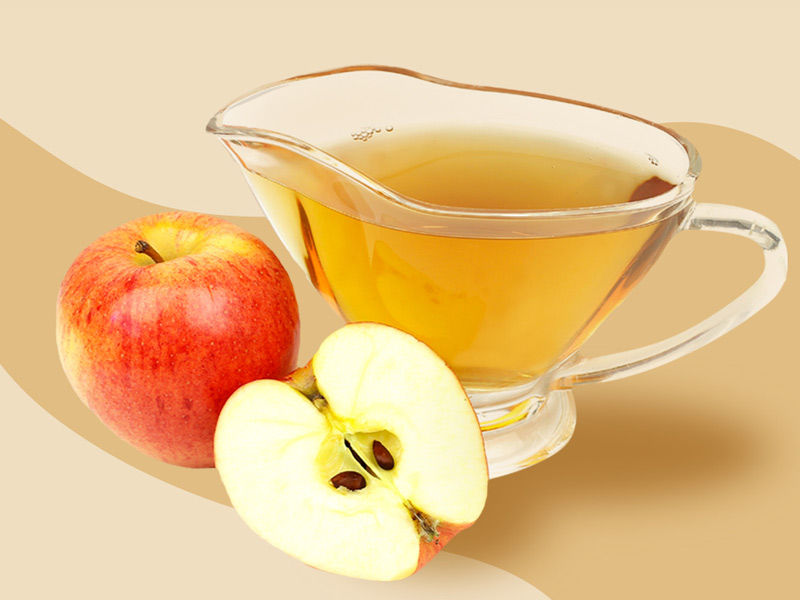Apple Cider Vinegar has earned a lot of public attention.
These days, more people are attempting to change their lives by making healthy and more sustainable decisions, which is why apple cider vinegar can be seen almost anywhere. There is a discussion involving fitness, food, or home remedies. For a long time, apple cider vinegar has been used as a natural treatment for health issues. The majority of apple cider vinegar’s health effects have been scientifically validated.
Drinking apple cider vinegar improves our health and aids in maintaining our metabolism. Still, it won’t make a significant difference unless you’re taking other measures to improve your health as well. There is no cure for an unbalanced diet and unhealthy lifestyle; the importance of moderation and discipline cannot be ignored!
What exactly is Apple Cider Vinegar?
Apple cider vinegar is an apple juice that has been through two fermentation processes. Crushed apples are combined with yeast, sugar, or another carbohydrate in the first step. Normal bacteria and yeasts ferment the juice for a few weeks, converting the sugars to alcohol. The liquor is then converted to acetic acid in a second fermentation process, yielding apple cider vinegar.

In supermarkets, you can buy pasteurized or unpasteurized apple cider vinegar. Raw/unpasteurized apple cider vinegar is preferred over the pasteurized version. Its best suited for health reasons because it contains more natural bacteria and yeasts. The murky sediment in the bottle is made up of these ingredients, which are referred to as “the mother.”
Now that we have an idea about Apple Cider Vinegar let us look into their plethora of benefits!
Apple Cider Benefits
Apple cider vinegar benefits include antibacterial and antioxidant qualities. Furthermore, research shows that it can have health benefits, such as assisting weight loss, decreasing cholesterol, decreasing blood sugar levels, and improving diabetes complications. But its benefits don’t stop there!
1) Helps kill harmful Bacteria
Vinegar can aid in the killing of pathogens such as bacteria and viruses. For a long time, people have used vinegar to wash and disinfect, curing nail disease, lice, warts, and ear infections. More than 2,000 years ago, Hippocrates, the pioneer of modern medicine, used vinegar to disinfect wounds.
Vinegar present in Apple Cider Vinegar can also be used to preserve fruit. Studies show that it prevents bacteria such as E. coli from developing inside and completely ruining foods. So, Apple cider vinegar can be useful if you’re looking for a natural way to protect your food. Anecdotal accounts also say that applying diluted apple cider vinegar to the skin can help with acne. Still, there doesn’t appear to be any solid evidence to back this up.
In short, vinegar’s key ingredient, acetic acid, can destroy or discourage unhealthy bacteria from multiplying. It has a long tradition of usage as an antiseptic or organic food additive.
2) Aids in Weight loss

Vinegar has been shown in many human trials to improve feelings of fullness. This will lead to calorie reduction and weight loss. One research found that taking vinegar with a high-carb meal enhanced feelings of fullness, leading people to consume 200–275 fewer calories for the remainder of the day. Furthermore, a survey of 175 obese people found that drinking apple cider vinegar regularly decreased belly fat and helped them lose weight.
It cannot be stressed enough that adding or excluding single foods or additives, on the other hand, seldom has a significant impact on weight. Adopting helpful and supportive eating and exercise patterns leads to long-term weight loss. Overall, apple cider vinegar can help people lose weight by increasing satiety, lowering blood sugar, and lowering insulin. Apple cider vinegar is extremely low in calories, with just around three calories each tablespoon. In short, apple cider vinegar will make you feel fuller and consume fewer calories, potentially leading to weight loss.
Also Read, Detox Water: Health Benefits and Myths
3) Aids in Skincare

Apple cider vinegar is a common treatment for skin problems such as eczema and dry skin. The skin is mildly acidic by nature. Topical apple cider vinegar could help rebalance skin’s normal pH, strengthen the defensive skin layer, and reduce wrinkles. Apple cider vinegar’s antibacterial effects may theoretically help prevent skin infections related to eczema and other skin disorders. Still, there isn’t enough proof to fully support this research.
Diluted apple cider vinegar, on the other hand, is often used as a face wash or toner. It’s supposed to destroy bacteria to eliminate spots and is budget-friendly and easily available at the same time. Apple cider vinegar has antimicrobial properties and is naturally acidic. As a result, it could aid in the improvement of the skin layer and the prevention of infections. Nonetheless, it’s important to remember that applying apple cider vinegar to the skin without diluting it in water is not advised.
4)High in Healthy Nutrients
Apple cider vinegar is also high in nutrients and is considered a nutritional powerhouse!
Let’s look at the dietary profile of apple cider vinegar and see what makes it so special.
Apple Cider Vinegar contains Magnesium, iron, potassium, manganese, amino acids, vitamins, and just 3 calories per tablespoon. All these nutrients are very helpful for maintaining our body’s health.
The sugar in apples is fermented to make apple cider vinegar. This converts them to acetic acid, a key component of vinegar responsible for its health benefits. Acetic acid is what gives vinegar its acidic taste and scent. Researchers conclude that this acid is responsible for the health advantages of apple cider vinegar, and cider vinegar contains 5–6% acetic acid. While there is no evidence to prove this, some people claim that the mother is responsible for most health benefits.
5)Helps in maintaining Blood pressure and Diabetes
One of the most compelling uses of vinegar so far has been in the treatment of type 2 diabetes. High blood sugar levels are a symptom of type 2 diabetes caused by insulin resistance or an inability to produce insulin. People without diabetes, on the other hand, can benefit from maintaining stable blood sugar levels since some experts claim that elevated blood sugar levels are a significant cause of aging and a variety of chronic diseases.
When it comes to blood pressure, apple cider vinegar aids in the regulation of renin, a hormone released by the kidneys that regulate blood vessel constriction and dilation. The blood pressure increases as the blood vessels constrict. Since apple cider vinegar relaxes the vessels, blood pressure does not increase. Apple cider vinegar has also shown potential in enhancing insulin sensitivity and lowering blood sugar reactions after meals. But, avoiding processed carbohydrates and fructose is the most efficient and healthy way to control blood sugar levels. However, apple cider vinegar can also help.
When it comes to blood pressure, apple cider vinegar aids in the regulation of renin, a hormone released by the kidneys that regulate blood vessel constriction and dilation. The blood pressure increases as the blood vessels constrict. Since apple cider vinegar relaxes the vessels, blood pressure does not increase!
6) Heart diseases
Apple Cider Vinegar can help lower cholesterol and triglyceride levels, linked to an increased risk of heart disease. Furthermore, alpha-linolenic acid has been shown to lower the risk of heart failure in women. In hypertensive rats, vinegar has been shown to lower blood pressure, which is good news because elevated blood pressure is related to cardiovascular disease and higher mortality rates. If your heart health is an issue, adding it to your diet may be worth considering. And although there isn’t enough evidence to suggest Apple Cider Vinegar helps human bodies, it doesn’t hurt to try it out!

Although Apple Cider Vinegar aids in maintaining the overall health of our body, it is important to keep the dosage in mind.
It’s best, to begin with, small doses to stop going overboard. Too much vinegar may have negative consequences, such as tooth enamel degradation and drug interactions.
Organic, unfiltered apple cider vinegar with “mother” is also recommended by some dietitians.
Cooking with apple cider vinegar is the perfect way to add it to your diet. It’s a simple compliment to salad dressings and homemade mayonnaise, for example.
Some people drink it as a beverage after diluting it in water. 1–2 teaspoons (5–10 mL) to 1–2 tablespoon (15–30 mL) a day, diluted in a big glass of water, is a common and healthy dose!

























